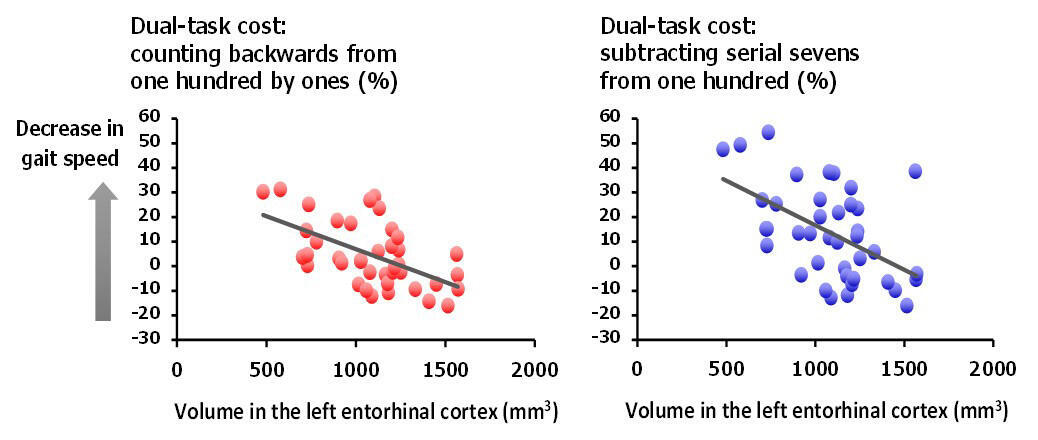An international group of researchers discovered changes to the brain that correlate with slower dual-task gait among older adults with mild cognitive impairment (MCI). The finding helps in understanding the neural mechanism that makes gait, or motion testing, while simultaneously performing a cognitively demanding task an effective predictor of progression to dementia
Dual-task gait tests measure an individual's walking speed while he or she attempts a cognitively demanding task. In older adults, a dual-task gait test usually causes a reduction in walking speed. This reduction or slowdown is referred to as the "dual-task gait cost". However, walking speed tends to slow down even more in older adults with MCI, which is an intermediate stage between the expected cognitive decline of normal aging and a more serious decline of dementia.
In a recent study, Dr. Manuel Montero-Odasso and a team of researchers at Lawson Health Research Institute and Western University in London, Ontario found that a high dual-task gait cost was associated with a two- to three-fold increased risk of progression to dementia. However, the neural mechanism underlying this association was unclear.
To address this research question, team members examined the medial temporal areas of the brain, particularly the hippocampus, the parahippocampal gyrus, and the entorhinal cortex, which are vulnerable regions in Alzheimer's disease. They analyzed how the structures of these areas were associated with dual-task gait cost. Participants were 40 older adults with MCI from the "Gait and Brain Study," a well-characterized cohort of older adults with MCI.
The researchers found those with higher dual-task costs had a smaller volume in the left entorhinal cortex. This finding is in line with previous studies reporting that progression to Alzheimer's Disease is associated with both structural deterioration and volume loss of the entorhinal cortex. The present study therefore suggests that both cognitive and motor dysfunction in older adults with MCI may share a common neural mechanism, and that dual-task-related gait changes may be a measurable motor marker of Alzheimer's disease pathology.

"These novel results show early brain changes that are common in pre-dementia states can be manifested by the way patients walk," says Dr. Montero-Odasso, scientist at Lawson, geriatrician at St. Joseph's Health Care London, and associate professor at Western University's Schulich School of Medicine & Dentistry. "This evidence supports walking (gait) assessment in clinics as an important test to help to predict dementia"
"Although the cross-sectional nature of this study suggests some caution when interpreting the findings, our results support the hypothesis that the slowdown of walking speed while performing a cognitive demanding task could be considered a marker for dementia in older adults with MCI," says Dr. Ryota Sakurai, senior researcher at the Tokyo Metropolitan Institute of Gerontology and first author on the study. Dr. Sakurai was previously a post-doctoral fellow at Schulich Medicine & Dentistry training with Dr. Montero-Odasso.
The study's team members included Dr. Montero-Odasso, Dr. Sakurai and Dr. Robert Bartha, an imaging scientist at Robarts Research Institute and a professor at Schulich Medicine & Dentistry.
Original article:
Funding information:
Dr. Ryota Sakurai held a scholarship award from the Japan Society for the Promotion of Science (JSPS) while conducting his postdoctoral research at the Gait and Brain Lab, University of Western Ontario. Dr. Montero-Odasso's program "Gait and Brain Health" is supported by grants from the Canadian Institute of Health and Research (CIHR), the Ontario Ministry of Research and Innovation, The Ontario Neurodegenerative Diseases Research Initiative (ONDRI), the Canadian Consortium on Neurodegeneration in Aging (CCNA), and the Department of Medicine Program of Experimental Medicine (POEM) Research Award, University of Western Ontario.
Contact:
Dr. Ryota Sakurai
Research Team for Social Participation and Community Health,
Tokyo Metropolitan Institute of Gerontology
Email: sakurair@tmig.or.jp